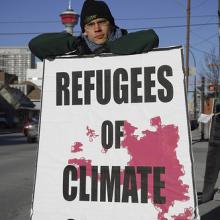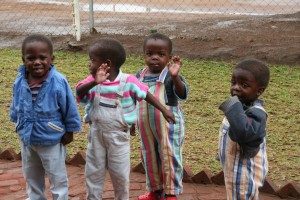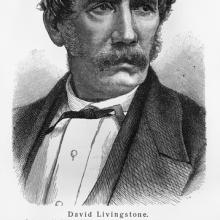Malawi
MY WIFE AND I left London for Africa in 1952 to serve as “agricultural missionaries” through the Anglican Church Missionary Society. For 65 years we have been living and working with farming families who live off less than five acres of land. In fact, 85 percent of the world’s farms are less than five acres.
The International Fund for Agricultural Development estimates that there are some 500 million small farms worldwide, and more than 2 billion people depending largely on agriculture for their livelihoods. Smallholder farmers produce 80 percent of the food consumed in Asia and sub-Saharan Africa.
Look for a billboard on the right and a sign on your left. There’s a dirt road. Turn there.
In this part of the world, most of the streets have no names. So the directions we were given to find the new compound where my son’s Malawian relatives relocated a few months earlier were pretty specific given the circumstances.
We had hoped to be able to visit with Vasco’s 16-year-old half-brother, Juma, his Aunt Esme, and a handful of cousins and other relations for a couple of hours. By the time we found the family’s new compound, we had less than an hour before we had to get back on the road, meet the rest of our traveling companions, and head north before the sun fell.
I was heartbroken. But when we pulled up in our van, Vasco’s relatives were so happy to see us (and vice versa) that even the woefully short visit felt richly blessed. It had been three years since we’d seen each other. The last time was in May 2010 when Vasco, my husband, and I traveled from California to Blantyre for our adoption hearing. We spent a month in Blantyre and were able to get to know Vasco’s extended family (or, sadly, what remains of it) and begin piecing together our son’s complicated biography.
Since our last visit, Vasco, now 13, has grown about a foot and then some. He’s also traded his close-cropped “Obama cut” for Bob Marley-esque locks. Vasco wasn’t the only one who’d changed – visibly and otherwise.
Malawi is one of the poorest countries on the planet, with more than 9 million people living on about $1.25 a day. HIV/AIDS, which we believe claimed the lives of Vasco’s birth parents before he would have entered kindergarten, remains a critical health issue. Among 15- to 49-year-olds, the HIV/AIDS rate hovers above 10 percent despite widespread efforts to combat the fully preventable disease.
Malaria, tuberculosis, and diarrhea-related fatalities remain high in Malawi. So does unemployment, particularly among younger workers in urban areas such as Blantyre, where it is approximately 70 percent.
While many people continue to believe there is no climate crisis, those most affected by global warming—particularly in the global South—know otherwise. According to Sojourners magazine’s interview with Malawi activist Victor Mughogho, the “impacts are quite severe on the ground.”
FOR MANY IN the global South, climate change is not an abstract theory. Victor Mughogho, executive director of the Eagles Relief and Development Programme in the southeast African country of Malawi, has experienced firsthand the toll of global warming and extreme weather. He works with local churches to develop practical and faithful solutions to mitigate the effects of climate change. Sojourners assistant editor Elaina Ramsey interviewed Mughogho early last year when he visited Washington, D.C.
Elaina Ramsey: How has climate change affected the people of Malawi?
Victor Mughogho: The impacts are quite severe on the ground. Rural people in Malawi constitute about 85 percent of the population. These people are subsistence farmers. For them, rainfall is everything. Without the rain, there's no agriculture, no livelihood.
The weather patterns have changed and are so unpredictable now. In the past 20 years, official records from the government show that we've had five severe droughts. Because of the cycles of drought, there is less and less water in the ground. The water table is sinking. Trees and grass are stunting and rivers are drying up.
If you asked a person "What will happen in the next 10 or 20 years?" they'd say that what's bad now, in retrospect, is going to look like a good time. It looks like worse times are coming ahead.
LONDON — When journalist Henry Morton Stanley found the world’s most famous missionary barely alive at the tiny village of Ujiji on the shores of Lake Tanganyika on Nov. 10, 1871, he gave the English language one of its most famous introductions: “Dr. Livingstone, I presume?”
As Britain marks David Livingstone’s 200th birthday on Tuesday, Christians are being reintroduced to one of the greatest missionaries and explorers of the 19th century. A new book, meanwhile, introduces a darker side to Livingstone’s globe-trotting career and the corrosive effect it had on his marriage.
That 1871 meeting in the heart of Africa is the stuff of legend.
In 1864, Livingstone — already one of the world’s most famous men because of his trek across Africa and the 1855 “discovery” of the Victoria Falls that straddles modern-day Zambia and Zimbabwe — mounted an expedition to discover the source of the Nile River.
As months stretched into years, nothing was heard from the famed explorer.
In 2007, I boarded a plane bound for Africa for the first time.
That trip took me to Kenya, Tanzania, the island of Zanzibar, and Malawi.
And that trip changed me — heart, mind, soul — forever transforming my family and my world.
Today, five years almost to the day since I flew to Nairobi to begin my first African adventure, I'm sitting in the international terminal of Dulles airport in Washington, D.C., waiting to board a 787 Dreamliner bound for Addis Ababa, Ethiopia.
An adventure lies ahead. And yet, so much more than that.
I've been to Africa twice now (this is my third visit to continent), and each time the people I've met and experiences I've had on the journey — all of it dripping with a grace so palpable I could almost smell it like so much sandalwood smoke wafting from an incenser — have shaped me and recalibrated my spirit.
I don't know specifically what Ethiopia has in store for me, but I am sure of one thing: The Spirit will be there.
I find myself thinking a lot about maternal mortality (and the issues that surround it, like access to contraception) lately, partly because I’ll soon be moving to a country with one of the world’s most dismal maternal mortality rates, and partly because my husband and I aren’t planning to have more biological children, which means that we’re contracepting for the duration.
Also, Nicholas Kristof and Sheryl WuDunn’s Half the Sky movement is gaining even more visibility — PBS’s Independent Lens is creating a series of short films and some longer features on issues raised in their bestselling, well-worth-reading book even as birth control reemerges again and again as a point of contention between Catholic bishops and nuns, between government policy and religious conviction, and even, as Amy Frykholm as suggested, among evangelicals.
Recently I’ve become aware that unwanted pregnancies are nothing new — certainly not the product of a culture that’s “anti-life” or anti-children, as the new-ish evangelical suspicion of birth control has it. In the 1850s, Mathilde Shillock, a German immigrant settled on the Minnesota frontier wrote,
“God has entrusted us with a son...it seems that his father is happy over it, I myself do not wish for any more children, as I look upon life as a heavy burden. [...] pity is all I can offer [this child]. Pity and a feeling of duty towards him to lighten his blameless fate.”
Climate change experts and skeptics can hash it out all they want, but Victor Mughogho is living it.
His home country of Malawi is already feeling the effects of climate change in real and devastating ways. Five droughts in the past 20 years, coupled with changing weather patterns, have resulted in famine — and a generation of children growing up developmentally stunted because of malnourishment.

Demonstrator at a climate change rally in Calgary, Canada, 2007. Image via Wylio http://bit.ly/vZsCIN
Climate change affects the poorest the hardest. Most things do. In the parts of the world where climate change is most prevalent, it is those who have done the least to cause it that are bearing the brunt of its effects.
It is the Malawian farmer whose crops have failed because the seasonal rains didn’t start at the usual time. It’s a Bangladeshi who can see the sea-levels rising around her town year after year, and has nowhere to go. It’s even an American family whose food bill grows ever larger because of the stresses that a changing climate is having on food security worldwide.
These are neither the people nor the organizations that have spent decades turning a blind eye to their responsibility as good stewards of our environment. They are not the people who, in the face of more and more extreme weather patterns, turn an issue of human survival into an ideological war.
It is for them that we must adapt.
Awesome tweet of the day: The father of liberal theology, Fred Schleiermacher, was born today in 1768. “Born” and “today” are just metaphors, of course. (via @shipofools) Plus interfaith bridge building, an extensive interview from U2, Jana Riess is Flunking Sainthood, Pakistanian cell phone censorship, Oscar-worthy documentaries, urban farming, Malawi introduces an anti-farting law (seriously, see above) and more.

Less than one percent of the federal budget goes to foreign aid. Our spending on development and foreign assistance is not -- by any stretch of the facts or imagination -- our national debt.
Cutting foreign aid programs will do little to get us out of debt, but would be a devastating setback in the fight against global, extreme poverty.
And I'll be your new tour guide here at God's Politics.
Some of you may know me by my more official byline, Cathleen Falsani. I've been a contributing editor and columnist for Sojourners Magazine for several years now, writing a column every other month called "Godstuff" and also have contributed from time to time to this'a'here blog.
Andrew Berg, an International Monetary Fund African department policy adviser, is a nice man. I know this because he spent some time talking earnestly with me after an IMF press conference in which I'd asked a pretty confrontational question about Malawi, whose 2002 famine is often partly attributed to IMF (and World Bank) advice, and whose current bumper crops are attributed to ignoring it.
Berg looks a tiny bit like The X Files' Agent Skinner, but what this conversation [...]






